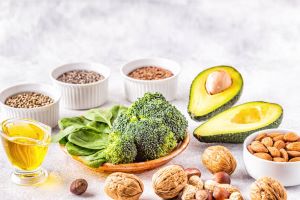By Reed Mangels PhD, RD
Atrial fibrillation, Afib for brief, is an irregular coronary heart rhythm. Some individuals with this situation haven’t any signs; others might discover a speedy heartbeat, dizziness, or shortness of breath. Afib will increase the danger of blood clots, stroke, and coronary heart failure. It could be handled with drugs, procedures, or surgical procedure. Some research have discovered that folks with larger intakes of omega-3 fat from fish have a decrease danger of Afib (1); nevertheless, massive doses of fish-derived omega-3 fat have been related to the next danger of Afib (2). Many individuals don’t eat fish or use fish oil. Alpha-linolenic acid (ALA) is an omega-3 fats that’s present in meals together with inexperienced leafy greens, flaxseeds, flaxseed oil, and canola oil. Might ALA scale back the danger of Afib? Researchers from Denmark have been eager about exploring this query.
What’s the examine?
The examine (3) included greater than 54,000 middle-aged Danish adults. Originally of the examine, the investigators assessed the topics’ consumption of ALA and of omega-3 fat from fish primarily based on the topics’ data of what they ate. They have been adopted for a median of 17 years to see which topics developed Afib over that point interval.
What did this examine discover?
In the course of the follow-up interval, there have been 4,902 Afib occasions. The researchers discovered that topics consuming low quantities of omega-3 fat from fish and better quantities of ALA (greater than about 1.8 grams of ALA per day) had a modestly decrease danger of Afib. There was no relation between larger consumption of omega-3 fat from fish and Afib. In different phrases, for middle-age individuals not consuming fish or not consuming a lot fish, larger intakes of ALA have been related to a decreased danger of Afib.
Are there sensible implications?
This examine means that middle-aged vegans and different vegetarians, in addition to others who keep away from or restrict fish, might profit from larger intakes of ALA to cut back the danger of Afib. Topics with decrease danger of Afib had ALA intakes of 1.8 grams per day or extra – that is in regards to the quantity of ALA in 3 Tablespoons of walnuts, 2-1/2 teaspoons of chia seeds, a Tablespoon of floor flaxseeds, 1¼ cups of agency tofu, 1½ Tablespoons of canola oil, or ¾ teaspoon of flaxseed oil.
Curiously, different research have discovered that larger intakes of ALA are related to a decrease danger of sudden loss of life, narrowing and blockage of the coronary arteries, and occasions associated to blockage of arteries comparable to strokes and coronary heart assaults however solely in these with low intakes of omega-3 fatty acids from fish (4, 5). It appears prudent for vegans to eat meals which might be good sources of ALA usually.
References:
- Bork CS, Myhre PL, Schmidt EB. Do omega-3 fatty acids enhance danger of atrial fibrillation? Curr Opin Clin Nutr Metab Care. 2023;26:78-82.
- Fatkin D, Cox CD, Martinac B. Fishing for hyperlinks between omega-3 fatty acids and atrial fibrillation. Circulation. 2022;145:1037-1039.
- Bork CS, Larsen JM, Lundbye-Christensen S, et al. Plant omega-3 fatty acids might decrease danger of atrial fibrillation in people with a low consumption of marine omega-3 fatty acids. J Nutr. 2024; 154:2827-2833.
- Mozaffarian D, Ascherio A, Hu FB, et al. Interaction between totally different polyunsaturated fatty acids and danger of coronary coronary heart illness in males. Circulation. 2005;111:157-164.
- Bork CS, Lundbye-Christensen S, Venø SK, et al. Plant n-3 PUFA consumption might decrease the danger of atherosclerotic heart problems solely amongst topics with a low consumption of marine n-3 PUFAs. Eur J Nutr. 2022;61:557-559.
To learn extra about omega-3 fat see:


